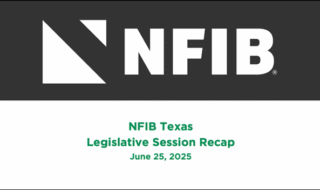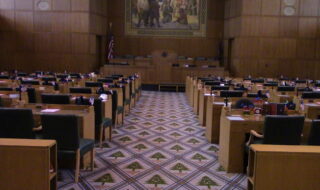February 10, 2025
"California's improved financial position"?
Welcome to the February 10-14 edition of the NFIB California Main Street Minute from your small-business advocacy team in Sacramento.
The Legislature
The legislative mill of bill introductions continues to revolve ever so slowly, due mainly to the attention the wildfires have commanded. As of Friday, February 7, only 876 measures have been introduced, and a February 21 deadline for bill introductions looms. From that number NFIB California Policy Director Tim Taylor has made an initial cut of around 100 measures for closer small business scrutiny.
One is, speaking of the wildfires, Assembly Bill 265 (Caloza). Titled the Small Business Recovery Fund Act, it “would appropriate ($100,000,000) from the General Fund to the Small Business Recovery Fund, which would be created by the bill … The bill would authorize the funds to be used for, among other things, support recovery and rebuilding efforts, and would require a grantee to match the amount of the grant awarded. The bill would … award grants in amounts that range from $2,500 to $100,000, inclusive.”
NFIB is currently reviewing AB 265 for any pitfalls or traps it may contain before lending its support for its passage. But if the help states offered during the COVID pandemic gives any clues, not many small business owners plan on taking advantage. When asked on a 2021 NFIB survey, “Has your business received a state or local grant?,” 86% said ‘No.’ This compares to around 80% who took a federal Paycheck Protection Program loan and around 43% who took a second PPP loan.
Speaking of Wildfires and Rebuilding Help
As it did during the pandemic, the State Treasurer’s Office has produced another one-stop-shopping guide of resources victims of the wildfires can examine. The nine-page California Wildfire Recovery Resource Guide also has information on shelters, legal resources, and tax relief. The link can also be found in the NFIB California web story, Rebuilding Resources for Victims of the Southern California Wildfires.
Closing in on a Date
NFIB California is looking at February 18 as the date it will host a webinar on rebuilding from the wildfire devastation. Special guests include Governor Newsom’s top economic policy advisor, Dee Dee Myers, a top official from the Los Angeles Business Federation (BizFed), and NFIB Policy Director Tim Taylor will discuss legislative efforts to rebuild. Keep an eye on your inbox for more information.
In Case You Missed It
“After the fire, a crisis for Altadena’s small-business owners: ‘Who is going to want to come here?’” – from the Los Angels Times.
“All told, estimates of the total economic loss from last month’s wildfires in and around Los Angeles have swelled to more than $250 billion, making it one of the costliest natural disasters in U.S. history. Nearly 1,900 small businesses were within the fire burn zones and were probably affected, according to an estimate from the L.A. County Economic Development Corp. Those businesses supported roughly 11,400 jobs.
“Now, regardless of whether their stores survived the flames, small-business owners say they are facing a crisis. Those who lost their businesses are wading through insurance claims and loan applications while wrestling with whether to rebuild. For owners whose stores remain, there’s damage from smoke and ash, utilities that have yet to be restored and the fear that customers won’t return for a long time, if ever.”
Excerpts
“The next morning, Steve’s Pets was still standing and she drove over to evacuate the animals. On the way there, she received a call saying the shop was engulfed in flames.
“All the animals, including beloved Pesto, were gone.
“Distraught and grieving the losses, Meyers also had to worry about the livelihoods of her seven employees. She sent a group text encouraging them to get on unemployment, and after receiving $25,000 from insurance, she issued paychecks. Her daughter, Hannah, started a GoFundMe to help the employees.
“Meyers doesn’t plan to reopen. She said she needs to focus on rebuilding her home, and at 56, she’s ready for a break.
“… [Ashima] Gupta anticipated it will take two to three years to recover. She and some of the other strip mall tenants are considering writing a letter to their landlord to ask for a reduction in their rents; an invoice just arrived for the nearly $6,000 a month she pays for the 2,500-square-foot space.”
Please, Don’t Bring That Up Again
Sorry, state policymakers, but small business would like to bring up, again, California’s outstanding $21 billion debt with the federal government over unpaid loans the state took out to shore up its unemployment insurance trust fund—the one that pays unemployment benefits to workers who lost jobs through no fault of their own.
It occurred to us to ask after reading in The Sacramento Bee that, “Salary increases, longevity pay and telework policies are all on the bargaining table this year as California prepares to begin negotiating with seven bargaining units representing over 50,000 state workers. Leaders of bargaining units hope that California’s improved financial position, compared to last year’s massive budget deficit, will translate into salary increases beyond the typical 2-3% adjustments.”
So, wouldn’t it make sense to use some of this “improved financial position” to start paying off, or down, our loans from Uncle Sam?
Little chance of that happening. In fact, if recommendations from the Legislative Analyst’s Office (LAO) are to be adopted, businesses should be paying more payroll taxes. “ … Whether or not the Legislature takes action, employers will soon pay more in UI taxes than they do today due to escalating charges under federal law … We recommend the Legislature increase the taxable wage base from $7,000 to $46,800, tying the taxable wage base to the amount of UI benefits a worker can actually receive ($450 per week).”
Did it have to come to this?
“Unlike dozens of other states, California and New York devoted almost none of the tens of billions of dollars in flexible federal funds they received during the pandemic toward repaying their loans,” writes Matt Weidinger, senior fellow at the American Enterprise Institute. “They instead spent that money, for example devoting $12 billion to ‘Golden State stimulus checks’ and $2 billion to New York’s unprecedented unemployment benefits program for illegal immigrants.”
No bill yet has surfaced in the Legislature instituting the LAO’s recommendation, which, should it, NFIB would vigorously oppose.
National
Highlights from NFIB Federal Government Relations Principal Josselin Castillo’s weekly report
— NFIB sent letters to Sen. Steve Daines (MT) and Rep. Lloyd Smucker (PA-11) in support of the Main Street Tax Certainty Act.
— NFIB filed an amicus brief at the U.S. Supreme Court in the case Diamond Alternative Energy v. EPA. NFIB urges the U.S. Supreme Court to consider the innumerable consequences that the D.C. Circuit’s decision will have on the small business community and the national economy.”
— NFIB sent a press release highlighting Vice President of Federal Government Relations Jeff Brabant’s interview on The Lars Larson National Radio Show where he discussed the Corporate Transparency Act (CTA).
— The NFIB Research Center released the January jobs report, which found that 35% (seasonally adjusted) of small business owners reported job openings they could not fill in January, unchanged from December.
— ICYMI: NFIB released the Small Business Growth Agenda for the 119th Congress. NFIB strongly encourages lawmakers to prioritize the legislative solutions outlined in the Small Business Growth Agenda to fight high inflation, reduce energy and healthcare costs, eliminate red tape, and increase competition – all of which will strengthen the small business economy.
Next Main Street Minute, February 17. All Main Streets Minutes can be found on the NFIB website here. Pull down the California tab in the upper-right-hand corner.
NFIB is a member-driven organization advocating on behalf of small and independent businesses nationwide.
Related Articles














